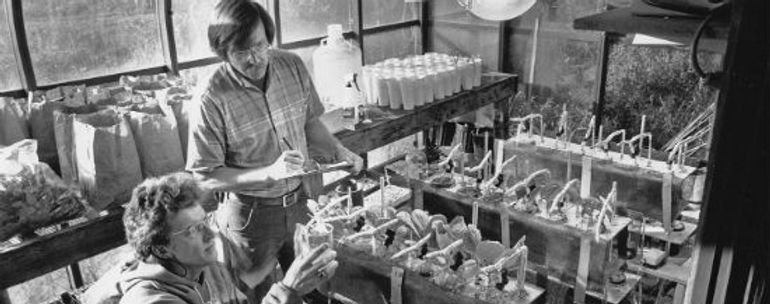What is PICA?

Ailee Arias and Claire Swetlin in the PICA Garden.
The Program in Community and Agroecology (PICA) is an educational program focusing on hands-on sustainable living skills, food systems and food justice issues. PICA is open to all UCSC students and the greater community. An aspect of PICA is that in the past we had a residential program, a themed housing option on campus where residents grow their own food together, share in community meals together, and strive to live more sustainably. PICA is located at the entrance to the Village at UCSC.
Through PICA, students from a variety of majors have the opportunity to study agroecology and apply their knowledge to everyday activities within their community.
Join us for our workdays, events, and sustainability workshops!
PICA Community Garden

Garden Workdays.

Herb Garden.

Community Meals.
The Garden
The Foundational Roots Garden, which lies adjacent the B-quad of the Village, is at the heart of PICA. Visiting classes, and wandering students alike come together in this garden to grow food, cultivate healthy soils, and sow hand collected seeds, all the while learning about nature through their personal experiences. Formerly an old rock quarry, the PICA B-quad Garden has become a place for students to learn about sustainable food systems and building healthy soil.
In the A-quad garden we also have our urban garden demonstration site, a rainwater catchment system, a herb spiral, a cob oven, a permaculture keyhole bed, a native plants garden and terrace beds.
The Greenhouse
The A-quad garden is also where the PICA greenhouse lives. In the propagation area, students learn about germination, seedling care, transplanting, and seed saving. During the winter especially, it becomes essential to start new plants indoors. The seeds stay warm and sheltered in the greenhouse until it is time to send them out into the garden.
The Compost
Located at the farm, our vermiculture composting system is a joint effort between PICA and the village residents. Village residents divert their food waste from the landfill into collection buckets in their buildings. These buckets are gathered weekly and added to the composting system. The goal of this partnership is to achieve complete food waste diversion in the Village Community. Currently, all buildings in the Village are actively engaged in the composting program. The process of converting food scraps and other organic matter back into a usable soil amendment is an important and vital step in sustaining the soil and community.
The Kitchen
Providing more direct links between students and the food they consume is one of the goals of the PICA program. Organic vegetables are harvested and cooked by PICA students, herbs from the garden are incorporated into fresh baked breads, and desserts may feature fresh fruit from trees planted by students in past years.


History

Professor Gliessman conducting research in the greenhouse.
PICA was founded in 2002 by Stephen R. Gliessman, Alfred E. Heller Professor (emeritus) of Agroecology in UC Santa Cruz's Environmental Studies Department. Steve also created a two unit PICA Seminar class that was offered through the Environmental Studies Department (ENVS 91F/191F), where students were introduced to concepts of community and agroecology in the context of sustainability.
PICA has historically been a part of the Sustainable Living Center (SLC) with the Community Agroecology Network, which is the organization that provides fair trade coffee in many of UCSC's dining facilities.
Funding

Planting for the future.
The Program In Community and Agroecology (PICA) has historically been funded by student grant writing to the Campus Sustainability Council, Measure 43, and the Carbon Fund.
We are also funded through the generous support of our donors. To make a donation to support the Program In Community and Agroecology, please click here.